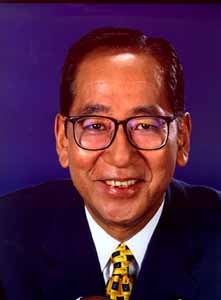
Shinji Satō (佐藤 信二 Satō Shinji, February 8, 1932 – May 3, 2016) was a Japanese politician. A member of the Satō-Kishi-Abe family, he was the second son of Prime Minister Eisaku Satō and followed him into politics. A member of the Liberal Democratic Party of Japan, he served in the House of Councillors (1974–1979) and House of Representatives (1979–2000 and 2003–2005), and also as and Minister of Transport (1988–1989) and Minister of International Trade and Industry (1996–1997).
History

Shinji Satō was the second son of Eisaku Satō and his wife Hiroko Matsuoka (松岡 寛子, 5 January 1907 – 16 April 1987). Shinji's older brother was Ryūtarō. Shinji was first elected to the Japanese House of Councillors in 1974, two years after his father left office as prime minister. He was elected to the House of Representatives in 1979. Satō served as Minister of Transport under Prime Minister Noboru Takeshita. In 1996 he became the Minister of International Trade and Industry, a very powerful position. This time he served under Prime Minister Ryūtarō Hashimoto.
Shinji's son-in-law, Masashi Adachi worked for him from 2003 to 2004. Masashi Adachi currently serves in the House of Councillors, and formerly worked as an aide for his cousin-in-law, Eisaku's grandnephew, Shinzo Abe.
Satō announced in 2012 that he had a document signed between his father and U.S. President Richard Nixon that would allow American nuclear weapons to be brought to Okinawa in emergencies.
References
- ^ "Ex-trade minister Shinji Sato dies at 84". The Japan Times. 2016-05-04. Retrieved 2020-09-17.
- 阿達雅志. "阿達雅志(あだちまさし) - 公式サイト". 阿達雅志(あだちまさし) - 公式サイト (in Japanese). Retrieved 2020-09-17.